Tag Archives: Charles P. Rogers
Things We Like: Sleeping In Total Darkness

Post by Kyle St. Romain
In previous articles, we’ve discussed the three basic ingredients for a good night’s sleep: (1) a dark room; (2) a cold room; and (3) a luxurious bed. There are some other things you can do that will help you sleep more restfully, like: getting enough exercise, eating the right foods, and even wearing a pair of socks to bed, but a comfortable bed in a cold, dark room are the pillars of good sleep.
Unfortunately in today’s world, many people sleep in relatively light rooms. Some people even sleep with the television set on — something I do not understand. But even if you’re able to fall asleep in a lit room or actually prefer it, chances are you’re not getting the best night’s sleep you could. So today we’re going to discuss exactly why total darkness is a must-have for your mind and body to rest properly.
Darkness was probably something our ancestors took for granted (read: feared). With no electricity or artificial lights, early humans lived by the natural cycles of day and night — the key word being natural. With the advent of fire we started to become masters over our domain. Fast forward to present time and it’s all but impossible to find total darkness outside unless you’re camping somewhere remote. This is especially true for those of us who live in urban environments where almost every street is laden with artificial lights — lights that are considerably brighter than what we would otherwise be exposed to at night (the moon and stars).

In darkness, our brains are wired to produce melatonin, a hormone that helps lower blood pressure, glucose, and body temperature. The production of melatonin is one of the most important physiological responses that helps us sleep better. When melatonin production is suppressed, we start to go into sleep debt, which can cause fat gain, insulin resistance, and inflammation.
When we are exposed to light before going to sleep, however dim, our bodies’ natural rhythm gets thrown out of whack. Making matters worse is that many light bulbs, computer screens, and smartphones emit blue light, one of the most stimulating colors of light. Exposure to blue light from a computer screen is why it’s harder to fall asleep quickly after responding to those late night emails.
If you’re struggling with overexposure before bed, here are some helpful tips for eliminating light before sleep:
- Blackout curtains are an easy way to keep unwanted light from coming through your windows.
- Get rid of electronics in the bedroom. All those little power indicators can create quite a bit of light in an otherwise dark room. Clock radios, televisions, computer screens, and other gadgets are common sources of light in the bedroom. Even if these devices are not emitting light, their electrical currents can still disrupt your sleep pattern, so get them out of the bedroom.
- Color shift your computer screen. Working late is a fact of life for many of us, but if you have to be on the computer after sundown, you should at least try to minimize the damage. Having used the program f.lux for a number of years, it now hurts my eyes to look at a “regular” screen at night. This is something I cannot recommend enough.
So next time you’re having trouble going to sleep, think about how much light you were exposed to right before bed. You may find that a little less light is just what your body needs to get out of sleep debt.
Breakfast in Bed – Savory Mushroom Aebelskiver (Danish Filled Pancakes
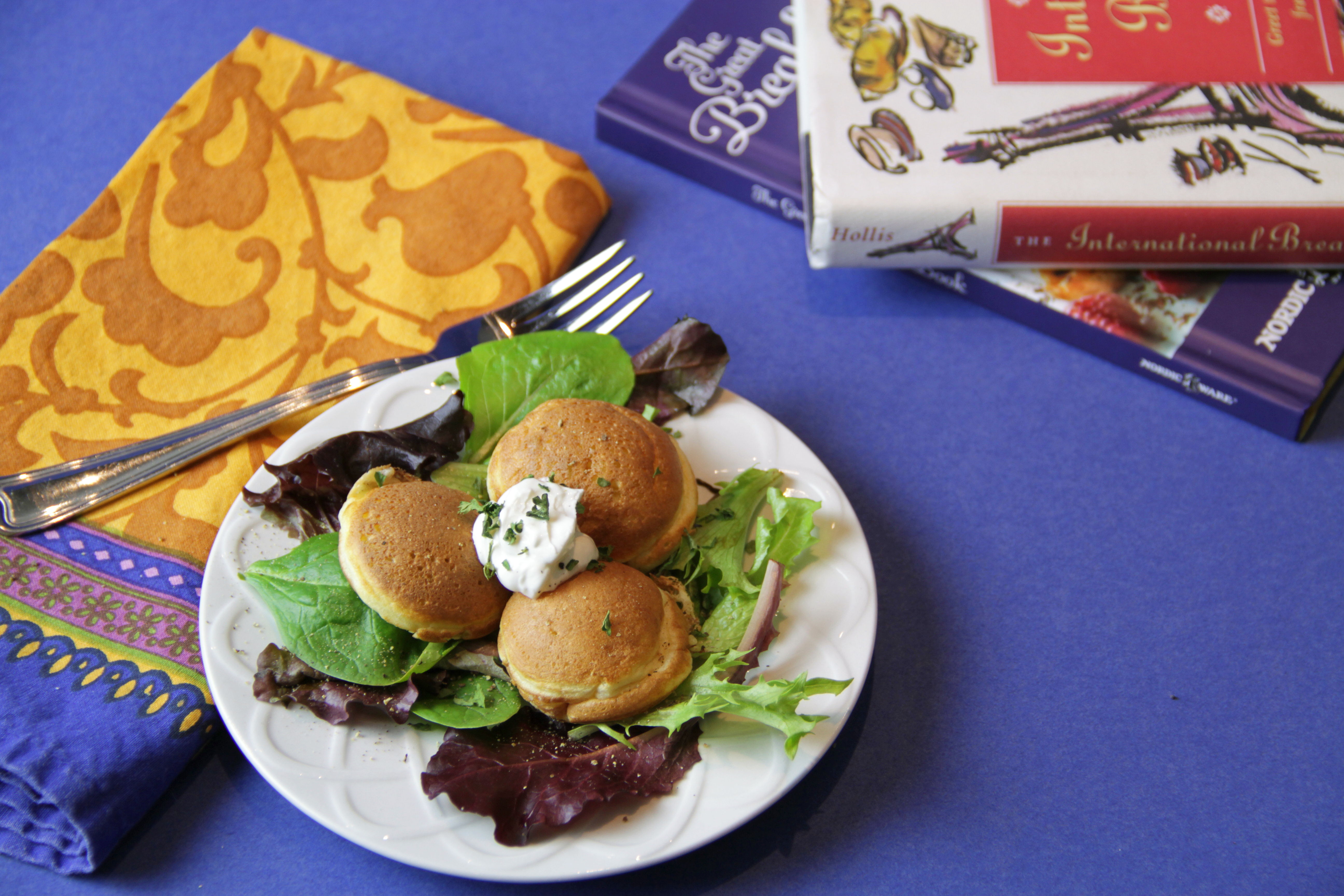
Post by Alison Hein.
My good friends Rosie and Jeff come through again! Rosie is the idea person behind our International Breakfast theme (remember Personal Shakshouka?) and Jeff is the talented cook who recently created a Proper English Fry-Up. What now, you ask? Well, Rosie gifted me with a new aebelskiver pan – the non-stick kind which makes flipping the little pancakes a breeze. Better yet, she gave me a breakfast cookbook which included savory aebelskivers! Goat cheese and herbs, jalapeño and cheddar, potato and bacon…
I decided upon a duxelles filling (sautéed shallots and mushrooms) for my aebelskivers. What a delight to bite into a tiny filled pancake and be surprised by the deep, earthy flavor of buttery button mushrooms. Served with a dab of sour cream on the side, Savory Mushroom Aebelskivers are a pleasant change from sweeter fare, and a delightfully different breakfast in bed.
And Jeff? He presented me with a recipe book filled with international breakfast recipes and a promise to cook for us again. This time – Jeff’s Costa Rican Tico Breakfast – coming soon to a kitchen near you! Stay tuned…
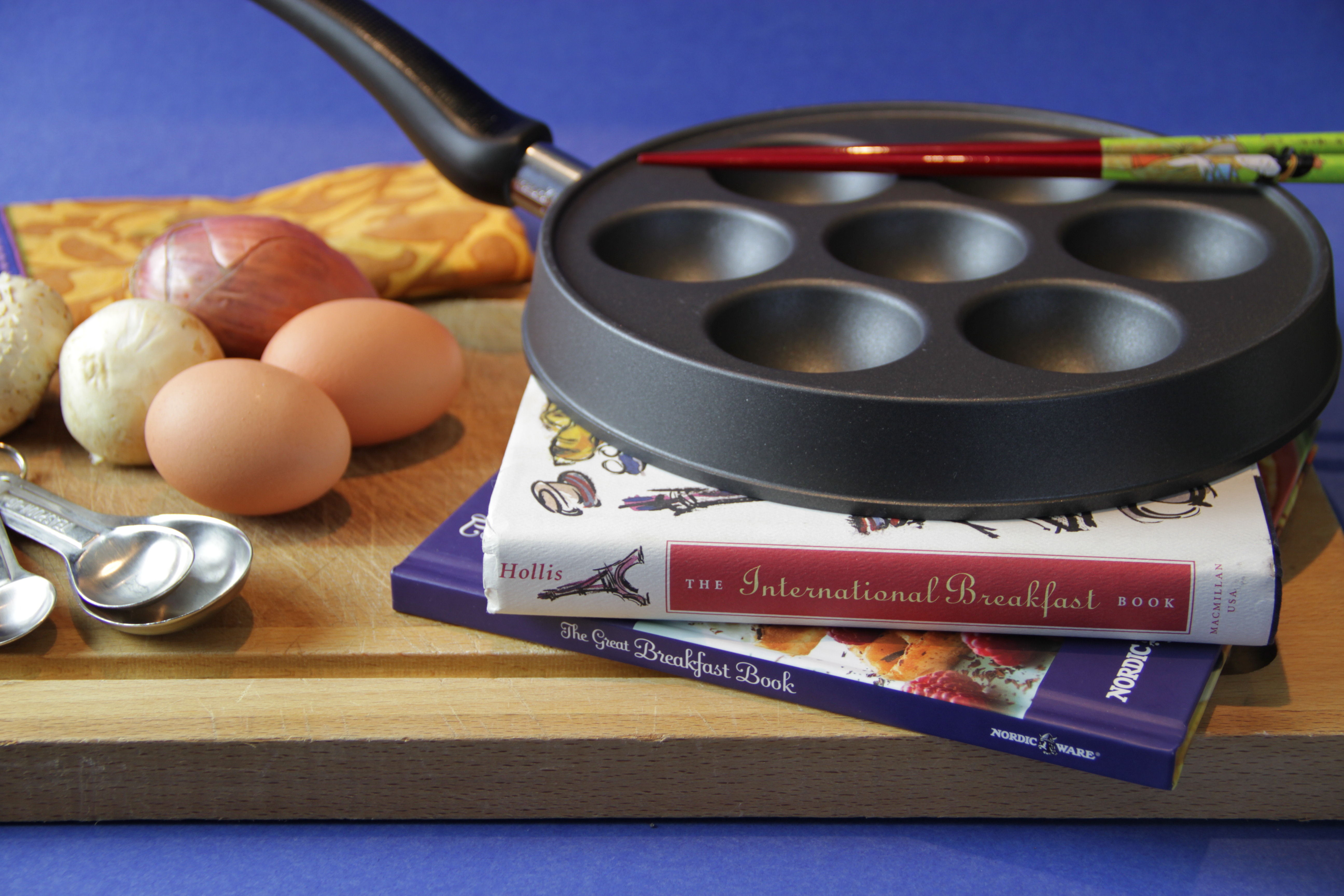
Ingredients
Mushroom Filling
2 tablespoons butter
1 shallot, finely chopped
8 ounces mushrooms, finely chopped
1 tablespoon cream
1 teaspoon dried parsley
Salt and pepper, to taste
Aebelskiver
1 cup unbleached flour
½ teaspoon baking powder
½ teaspoon salt
1 cup milk
1 tablespoon cider vinegar
2 eggs, separated
Cooking spray (or melted butter)
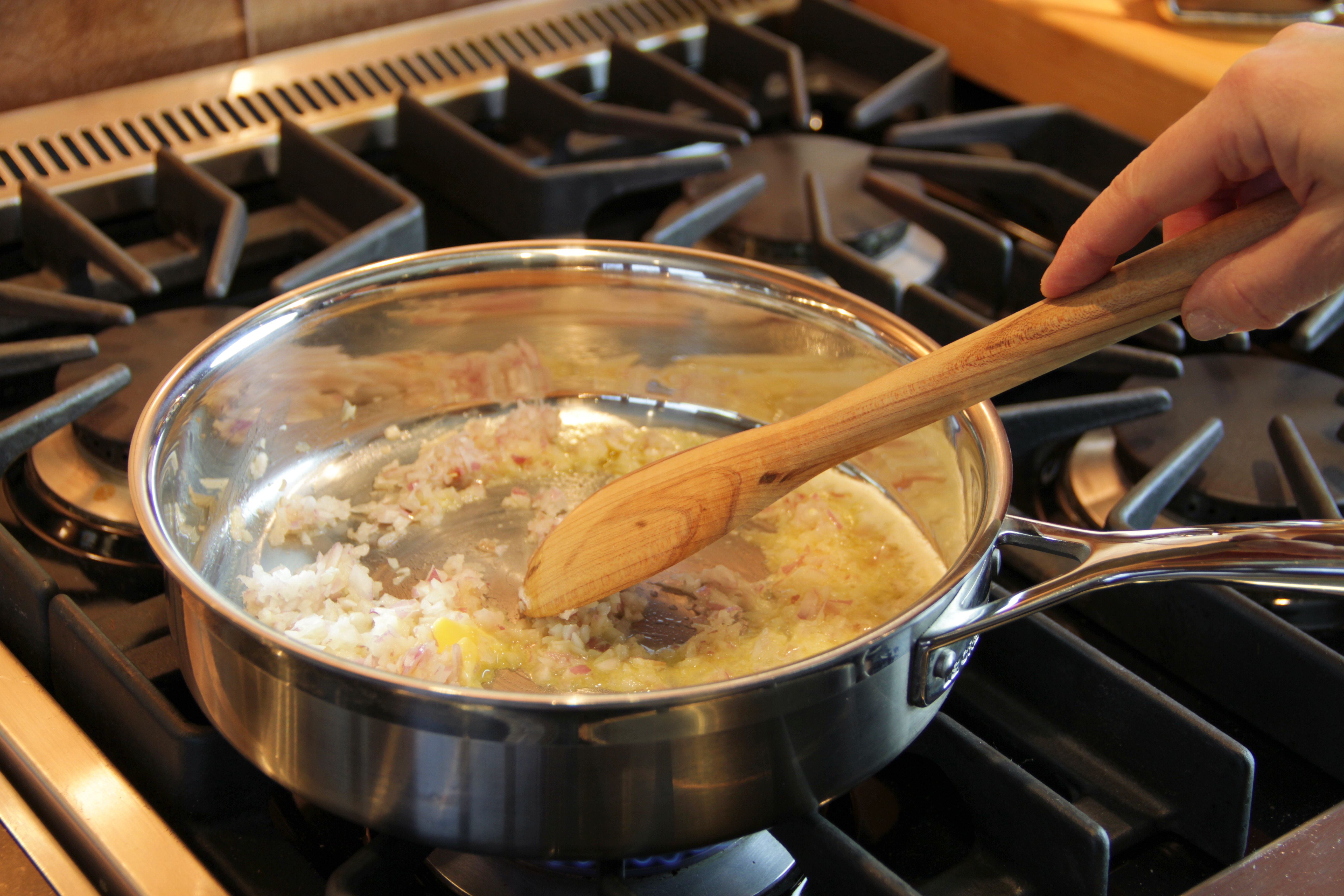
Special Equipment
Aebelskiver pan
Preparation
To make mushroom filling, melt butter in heavy saucepan over medium heat. Add shallot and cook for 1 to 2 minutes, until softened. Add mushrooms and continue to cook another 5 to 7 minutes, until mixture is cooked through. Remove from heat. Stir in cream, parsley, salt and pepper and set aside until ready to use.
To make aebelskiver, combine flour, baking powder and salt in large bowl. In separate small bowl, mix together milk, cider vinegar and egg yolks. Gradually add liquid mixture to dry mixture, stirring constantly, until batter is smooth. Beat egg whites until stiff peaks form and fold into batter.
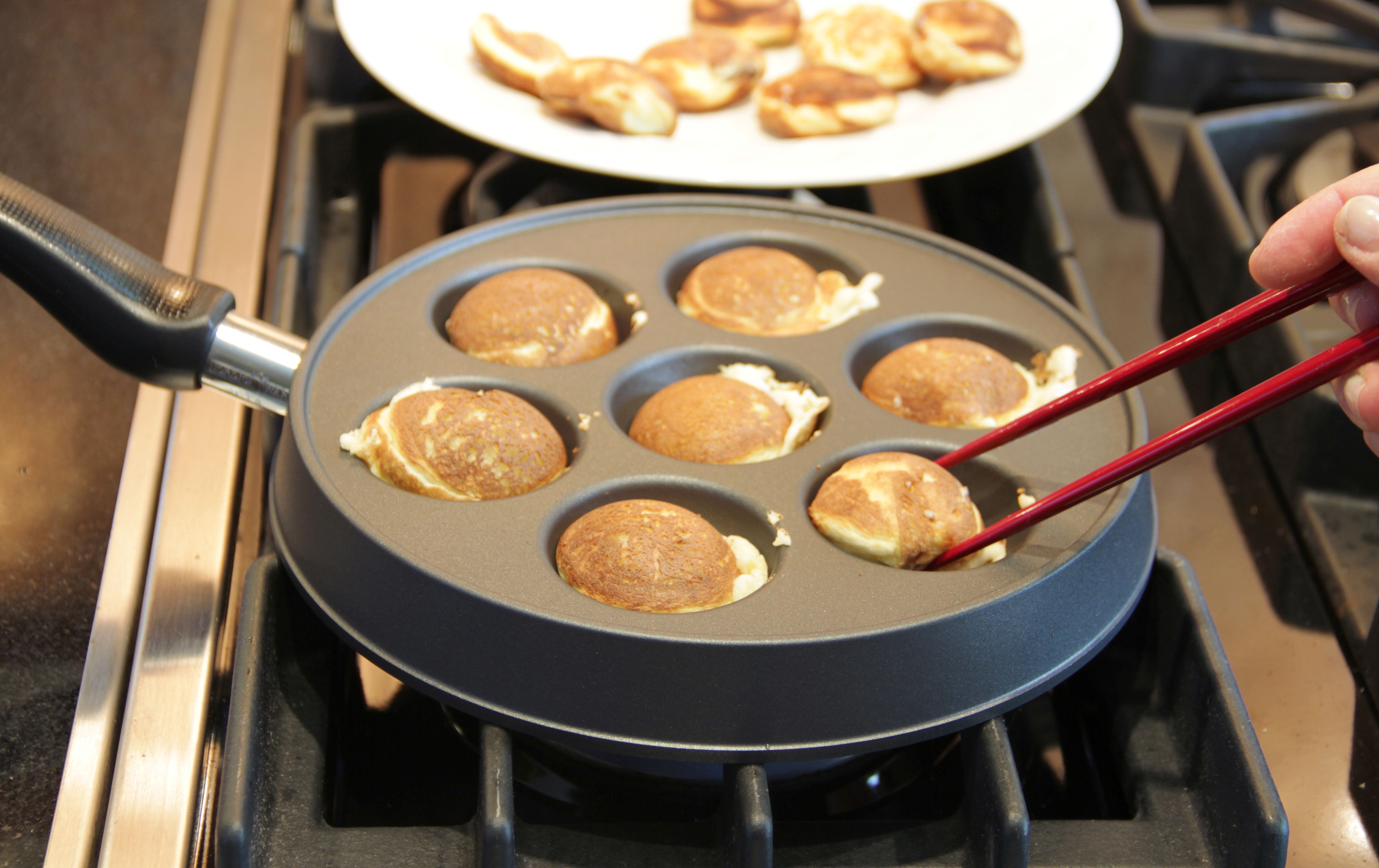
Place aebelskiver pan on burner over medium heat. Spray each well of the pan liberally with cooking spray (or brush with melted butter). Spoon about 1½ teaspoons of batter into each well. Then place about ½ teaspoon of mushroom filling in the center of each aebelskiver. Finally, pour another 1½ teaspoons of batter on top, being sure to entirely cover filling.
Cook for about 2 minutes, until bottom of aebelskiver is dark golden brown. Carefully flip using two skewers, a knife and spoon, knitting needles (as is common in Denmark), or chopsticks. Continue cooking until flipped side is also golden brown, another one to two minutes. Remove from pan and keep warm while making the remainder of pancakes. Adjust heat and regrease pan as necessary while cooking. Serve warm with a dollop of sour cream if you like.
Makes 20 to 30 aebelskiver.
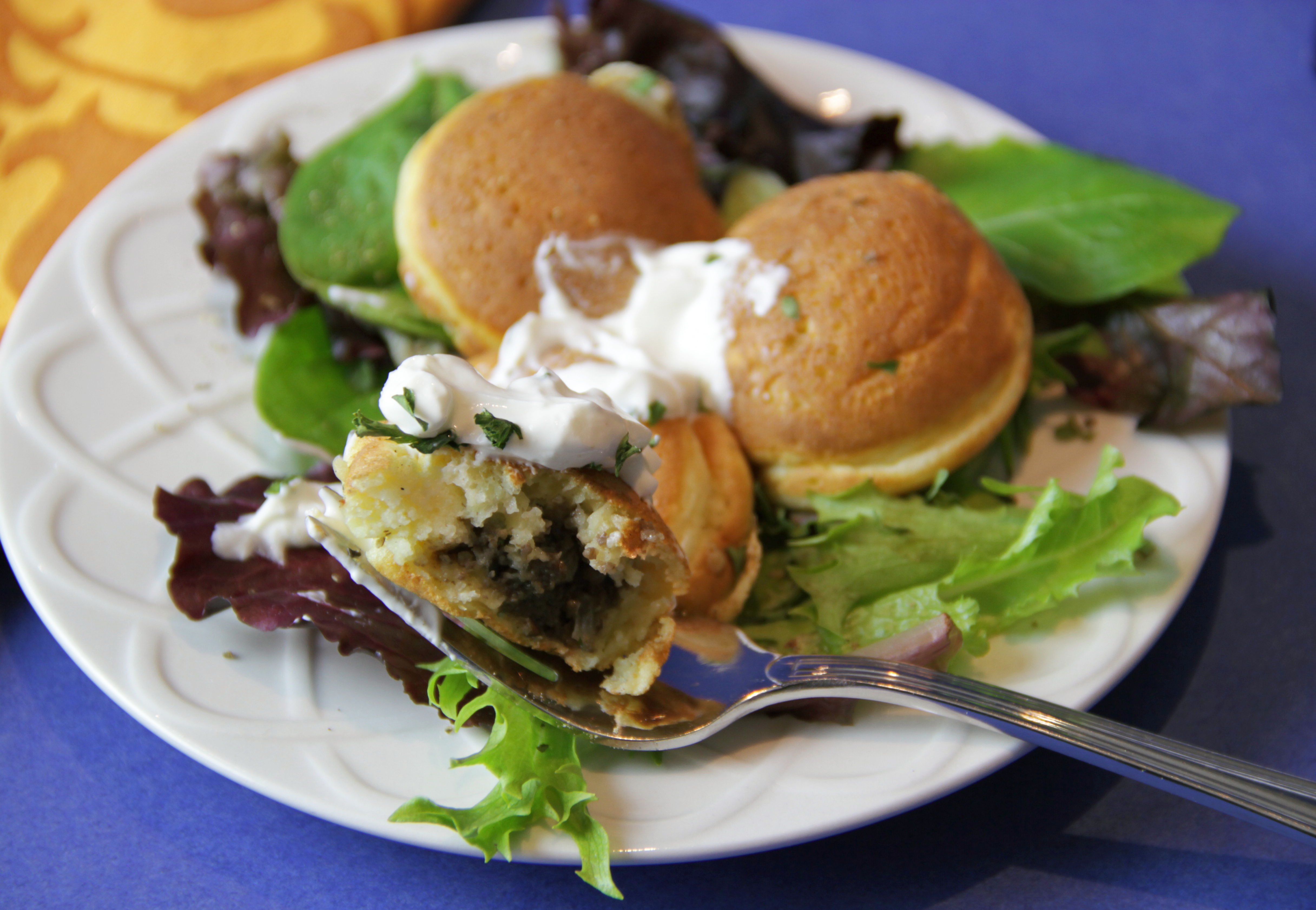
Things We Like: Four-Poster Beds

Post by Kyle St. Romain.
Throughout history beds have been used as a symbol of wealth – the more ornate and grand the bed, the wealthier its owner. Early in the evolution of the bed, anything raised from the floor was thought to be luxurious enough. After all, it beat sleeping on the floor! In the 13th century, however, the idea of a bedchamber was becoming more popular, i.e., enclosing the sleeping area with fabrics. The earliest bedchambers suspended fabrics from the ceiling to create a private sleeping environment. This concept later evolved into a four-poster bed, thought to have first been used in Austria, which created a more luxurious look and feel. Featherbeds, woolen blankets, and silk sheets were also introduced around this time, which made the beds functional and beautiful.
As trade and craftsmanship continued to grow, so did the bed. No longer a raised assemblage of wooden planks, beds had become works of art intricately carved, gilded with gold, and adorned with fine fabrics and precious stones. Four-poster beds were also quite large, with the Great Bed of Ware (which can be seen at the Victoria and Albert Museum) measuring a full 11 feet square. A bed of that size will make you second-guess whether a California King is really big enough!

The traditional four-poster bed would have been made from thick oak posts (up to 18 inches in diameter in some of the grandest examples), attached to the floor (not the bed), and connected by a series of rails along the top. Today, the posts of four-poster beds are usually connected to the bed itself, and come in almost every style imaginable — limited only by your taste and budget.
If you’re considering a four-poster bed, Charles Rogers makes a couple different styles of canopy beds made out of iron that can be draped in fabrics to create a very luxurious look. You can also check out the Houzz gallery to see how other people have dressed up their four-poster beds.
Breakfast in Bed: Walnut Bread
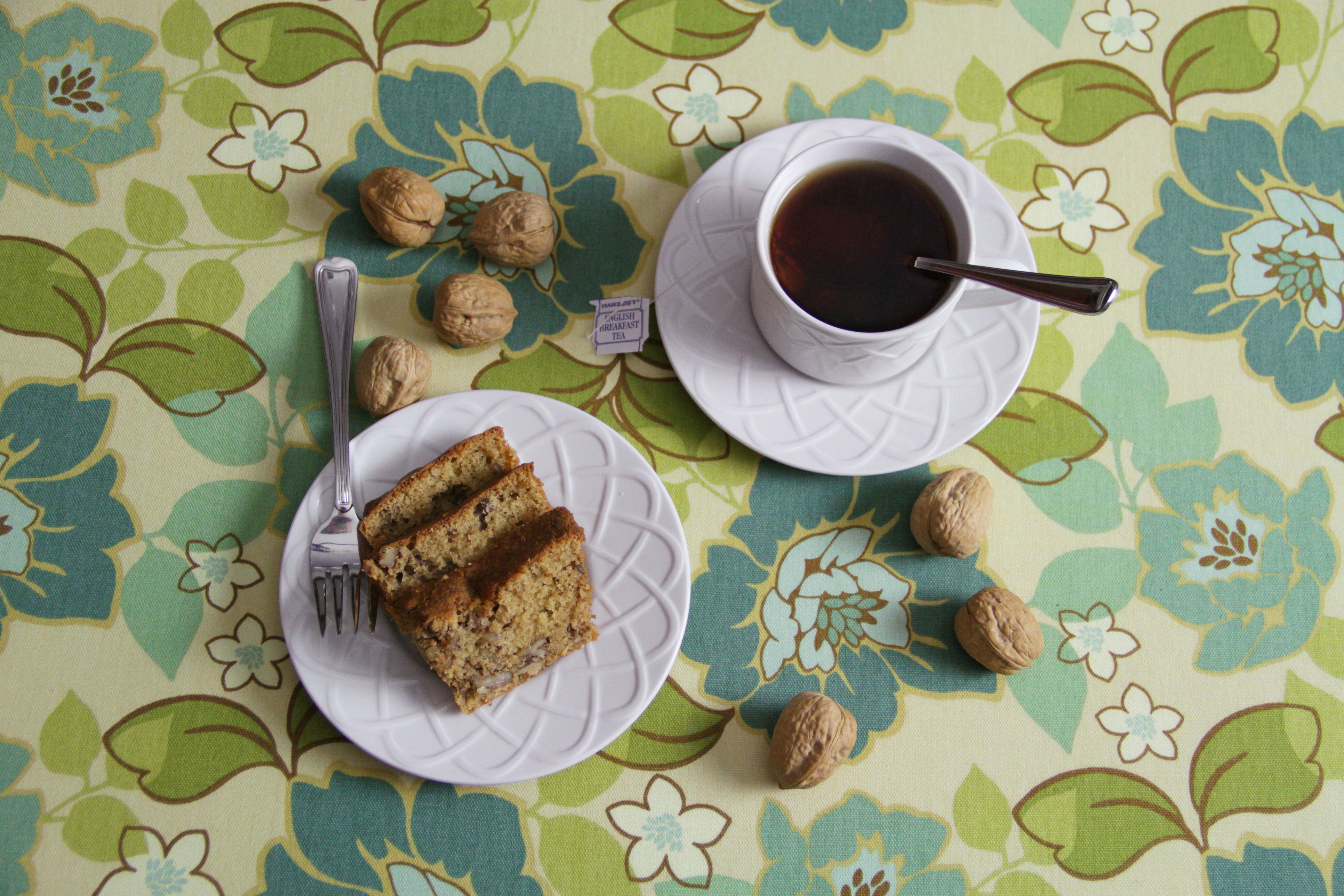
Post by Alison Hein.
Finding myself with a plethora of mixed nuts on hand after the holidays, I decided to make a sweet, dense walnut bread. Dark brown sugar provides a lovely colored base and texture for the deep, nutty flavor. A couple of eggs and a healthy dollop of sour cream add the needed lift, and a dash of cinnamon infuses a faint, lingering spice after each bite.
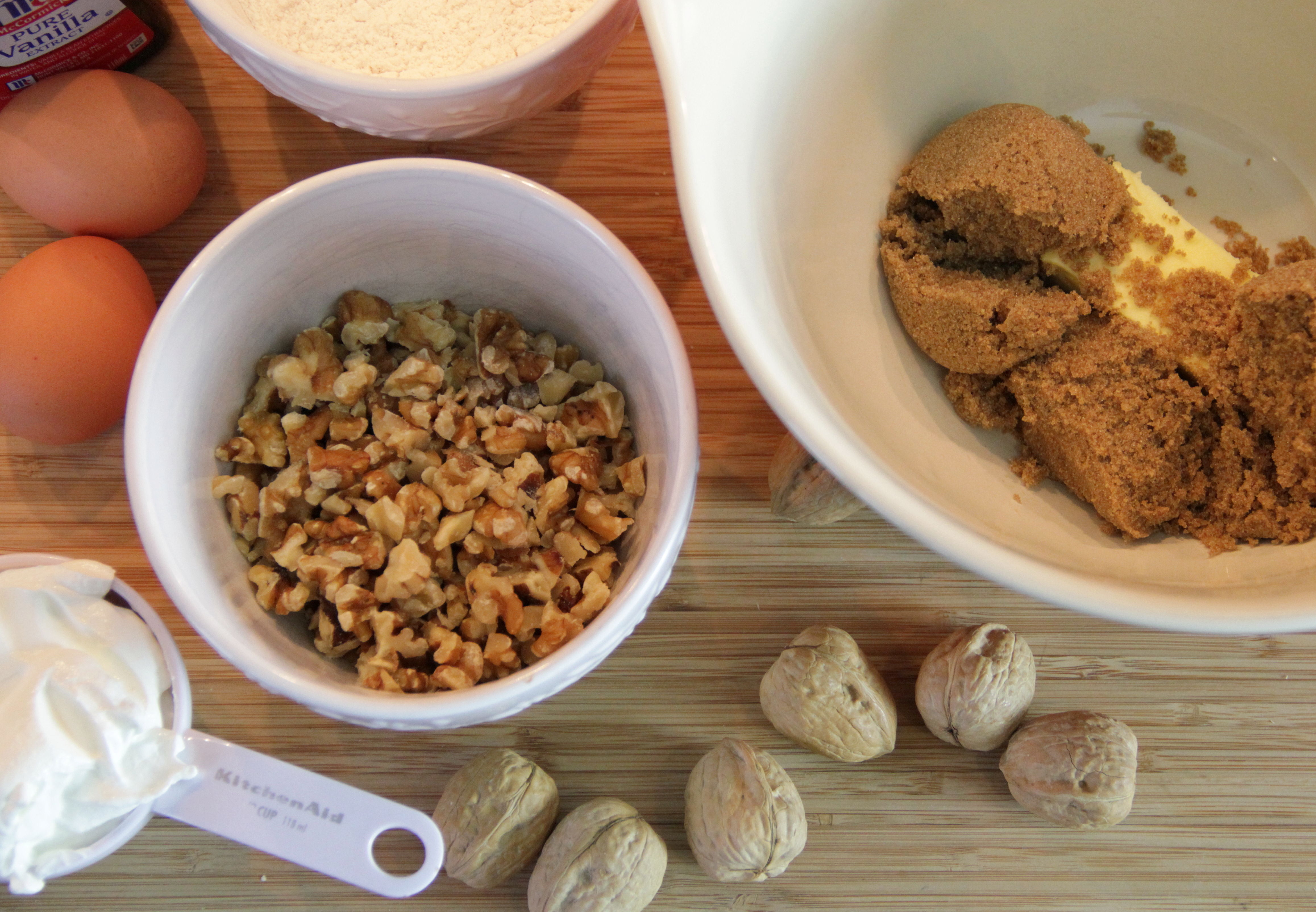
I wanted to give some Walnut Bread to a couple of friends, so I used three mini-bread pans for baking. You can also use a muffin tin, if you like. Just be sure to check on and monitor your baking a little earlier in the process to avoid over-cooking. Other types of nuts such as pecans or hazelnuts can also work well here, of course depending on your preference. Or, halve the amount of nuts used and add an equal amount of raisins or dried cranberries.
It doesn’t take long to mix up and bake this batter, but be prepared to wait until your bread is completely cooled before slicing or you may find yourself with a handful of sweet crumbles instead of sweet, crumbly slices.
A little more cakey than bread, and definitely more bready than cake, Walnut Bread is delicious at tea time with a strong cup of English Breakfast tea. Or, if you prefer, save it for the morning, slice it up properly and enjoy a sweet, nutty breakfast in bed.
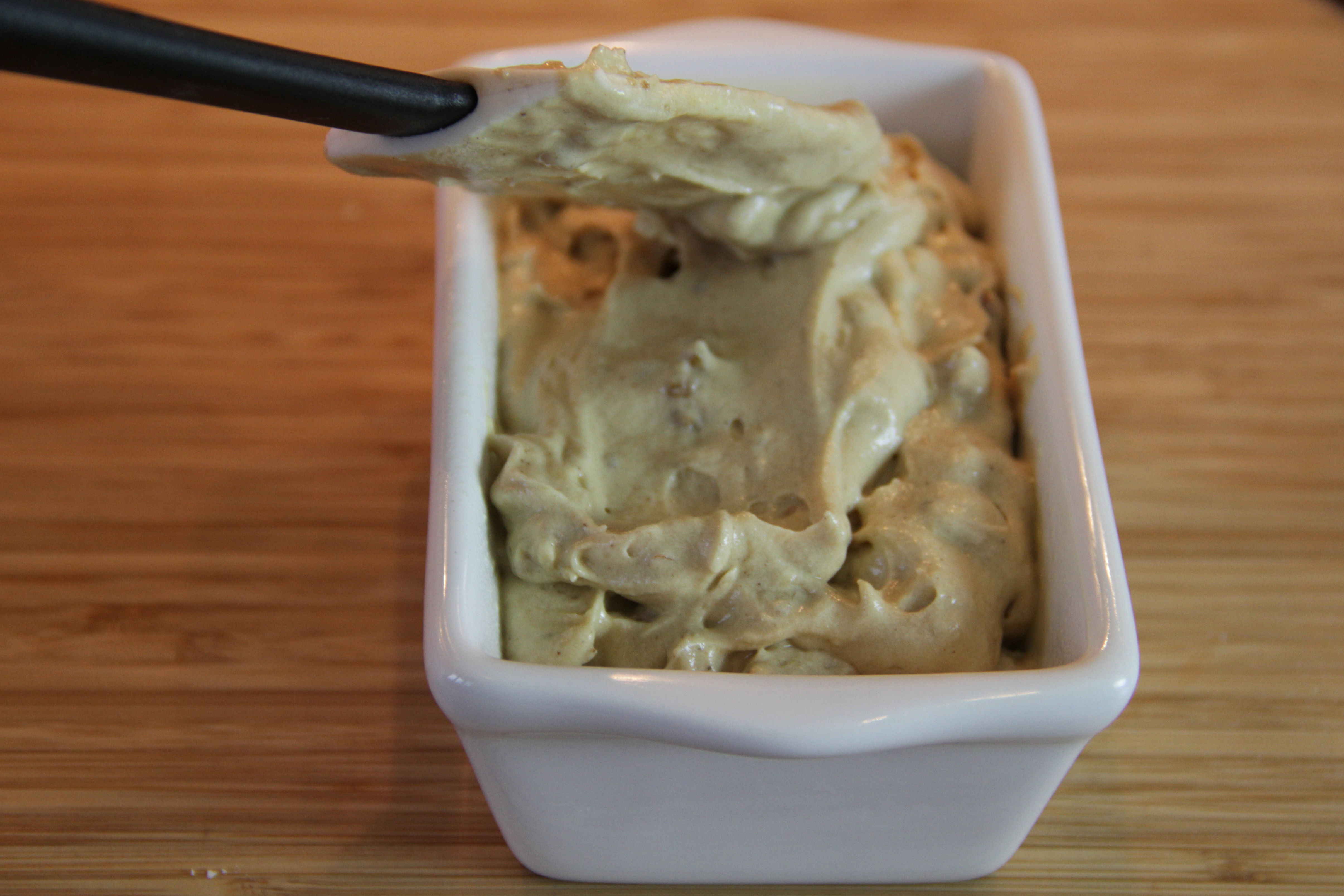
Ingredients
6 tablespoons butter, softened
¾ cup dark brown sugar
1 cup unbleached white flour
1 tablespoon baking powder
½ teaspoon salt
½ teaspoon cinnamon
2 eggs
1 teaspoon vanilla
½ cup sour cream
1½ cups chopped walnuts
Preparation
Preheat oven to 350°, and lightly grease 1 large bread pan, or 3 mini bread pans.
In a large bowl, beat butter and brown sugar until fully blended and slightly creamy. In a separate bowl, mix together flour, baking powder, salt, and cinnamon. Gradually add dry ingredients to the butter mixture, stirring until mixed to a light, sandy texture. Mix in eggs one at a time. Add vanilla and sour cream until smooth batter forms. Fold in chopped walnuts. Spread batter in greased pan(s). Bake at 350° for 45 to 50 minutes, or until toothpick inserted in center comes out clean. Cool on rack at least one hour before slicing.
Note: If using mini-pans, bake for 35 to 40 minutes, then test with toothpick.
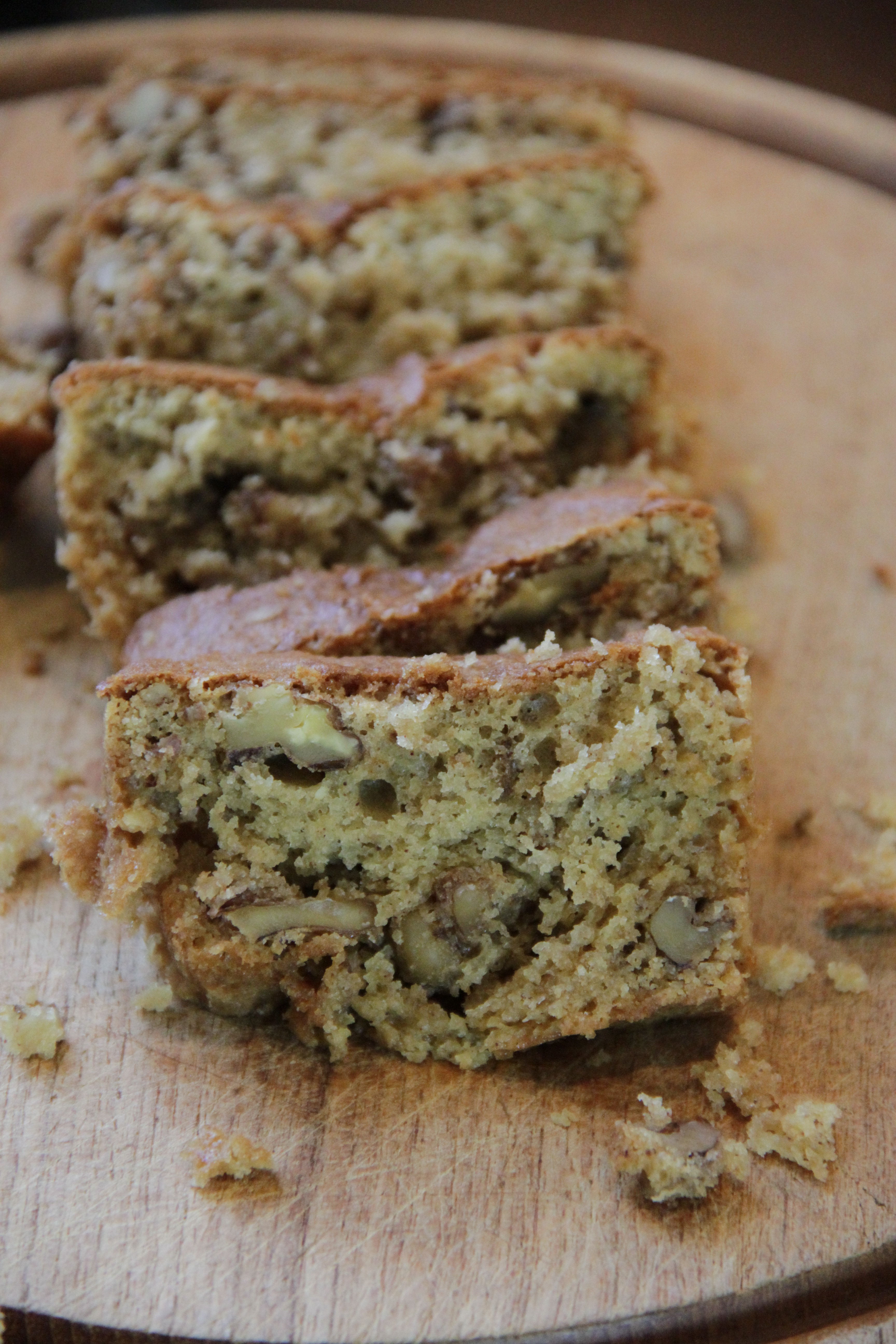

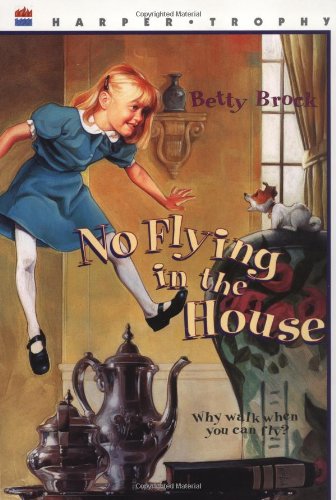 No Flying in the House by Betty Brock.
No Flying in the House by Betty Brock.